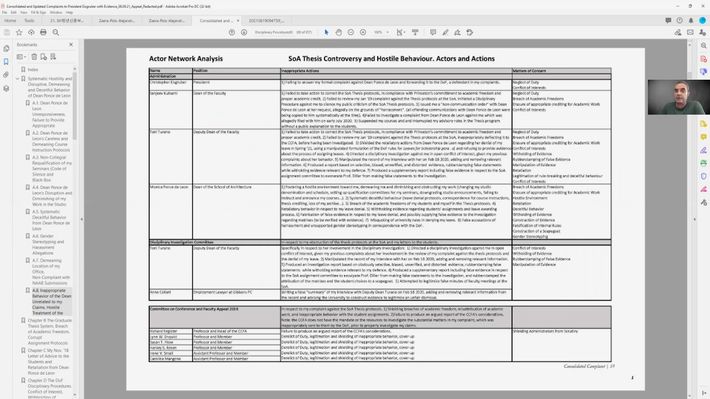
An architecture professor said he has been dismissed from Princeton University after a long investigation, and so has published a multimedia polemic mostly about himself but also, he writes, about the downfall of American academia. It is an extremely pure example of low-stakes-yet-high-drama academic-workplace nightmares.
“I write these lines from the academic epicenter of the culture of cancellation and ‘woke’ thinking, Princeton University,” Alejandro Zaera-Polo’s tale begins, in a document named “The Fascisms of Difference in the Post-truth University.” His text polemic is accompanied by nearly five hours of videos, posted on Vimeo over the last few weeks, called “The Gonzo Ethnography of Academic Authority.” The videos incorporate diagrams and many internal documents, and they are incredible. Episode one moves from Nietzsche to Latour and then quickly begins to trash the school’s faculty, starting with Elizabeth Diller, who, in addition to teaching at Princeton, is a principal of Diller Scofidio + Renfro.
“The ethnography is aimed to capture an extreme case of the malaises that affect universities in 2021,” he writes in the text. Those malaises include the institution’s capture by the “financial-informational-media-educational complex that today constitutes the center of American power,” its cancellation of Woodrow Wilson. Zaera-Polo also objects at length to his department’s being asked to compile candidates of “exclusively black ethnicity” for a hiring pool. (He notes that three candidates of “exclusively African-American ethnical background” were offered jobs consecutively, constituting “preferential treatment.”)
In the videos, there are many, many screenshots of interdepartmental emails that contain nuance that will never be intelligible to anyone outside the school. There are long and berating emails to colleagues about meta-topics, such as addressing his “alleged lack of collegiality,” which he writes, at great length, allows him to address “the dark side of conversationalism, which is the code of silence.”
One letter noted in his videos by one close watcher, from July 2020, shows that he is banned from any kind of contact with Mónica Ponce de León, the dean of the architecture school. According to the video’s screenshots of other emails, she had already informed him that “Your insults and threats make it impossible for me to do my job” and “I have already asked you to stop your aggression and your inappropriate behavior.”
The video series seems to end with a meditation on the meaning of evidence.
Most notable among his complaints is the situation of his office, located in the basement. Watchers of Netflix’s excellent Sandra Oh vehicle The Chair will recall this as a crucial plot point.
How did we get here? Alejandro Zaera-Polo, an architect who grew up in Spain and whose area of research is the façades of buildings, began teaching architecture at Princeton in 2008. In 2012, he became dean of the school himself — a decision more than half the students in the school protested. They didn’t like the opaque process behind the choice, but they also hadn’t liked his teaching. Despite that rocky start, in the summer of 2014, Zaera-Polo met with a triumph — the Venice Architecture Biennale, directed by Rem Koolhaas, had heavy representation of research from Princeton and included an exhibition (on, of course, façades) by Zaera-Polo himself.
Yet even while that exhibition was still on view, Zaera-Polo announced that he was resigning from that post. The university, it later came out, had charged Zaera-Polo with plagiarism in an essay he wrote for the Biennale exhibition catalogue.
This followed online gossip on Archinect that August:
In interviews, Rem practically disowned AZP’s part of the show, a research exhibition on facades […] Supposedly large portions of his text were plagiarized verbatim; this offense normally gets serious academic review and possibly could have him removed as dean. We’ll see soon enough. What’s even more shocking is that the source that he is accused of plagiarizing is Wikipedia (!). He is obviously not an academic, but, I mean, come on. Wikipedia?
“I’ve heard that it is no [sic] the first time he is accused of plagiarism, or maybe it is the same case,” responded someone on the thread. “I heard he crushes kittens, or maybe that he doesn’t,” wrote another.
This (the plagiarism charge, not the kitten-crushing) wasn’t actually true, or wasn’t entirely true. Rem Koolhaas had strongly defended Zaera-Polo, before the resignation, writing an email to the president of Princeton explaining that the essay was intended to be non-academic and hadn’t included footnotes.In early 2015, still a professor, Zaera-Polo began clarifying. “I did incur inadvertently in a few instances of paraphrasis,” Zaera-Polo explained unhelpfully in a letter, meaning he’d paraphrased a few things that in an academic context he’d normally cite. Princeton described this as “inaccurate and incomplete” and said he was asked to resign as dean because he’d written that he was “unfamiliar with the University’s policies on plagiarism.”
Eventually this conflict escalated to the courthouse, the extremely imperfect venue for settling matters of reputation. In a suit, Zaera-Polo accused the school and others of defamation — including trustees and the online gossipers. He had lost business and reputation, and the mystery around the resignation led to “false rumors of sexual or financial misconduct.” Since then he has remained at the school, an apparently excruciating five years in which, as we see from his video series, he has been an incredible troll, at best. This summer, a committee of the board of trustees voted to remove him as a professor. This week, the school cut ties with him.
Princeton did not return inquiries confirming the dismissal. “The Fascisms of Difference in the Post-truth University” and “The Gonzo Ethnography of Academic Authority,” probably his greatest and most captivating works, remain Zaera-Polo’s monument to his years at the university.








